Climate talks updates: The hard work at COP21 begins today in Paris
After years of faltering negotiations, the United Nations Conference on Climate Change is expected to produce a landmark agreement during the next two weeks. But it remains to be seen whether the gathering of 150 world leaders near Paris will achieve the target of limiting rising global temperatures to no more than 2 degrees Celsius above pre-industrial levels this century.
The Times will be covering the negotiations, including the large delegation attending from California with Gov. Jerry Brown.
You are reading Day 1 and Day 2 updates. Click here for Day 3 updates.
What does it mean for the climate?
That's what French newspaper Le Monde is asking on its front page Wednesday, along with images of President Obama and Bill Gates.
A new day is about to begin in Europe, and with that we begin a new live blog. Join us there .
From organizers' perspectives
Here's some video posted on the official Instagram account for U.N. Climate Action.
Laying the groundwork
As California's governor prepares to head to France, he is sitting for interviews and penning op-eds.
Co-writing with leaders in the West and Canada, Gov. Jerry Brown proclaims in the Seattle Times: "Here on the West Coast, we refuse to be daunted by the scale of climate change. Starting right in our own backyard, we are leading the way in creating and sustaining the clean economy of tomorrow."
'The green jihad is to protect and save lives ... and fight for climate justice'
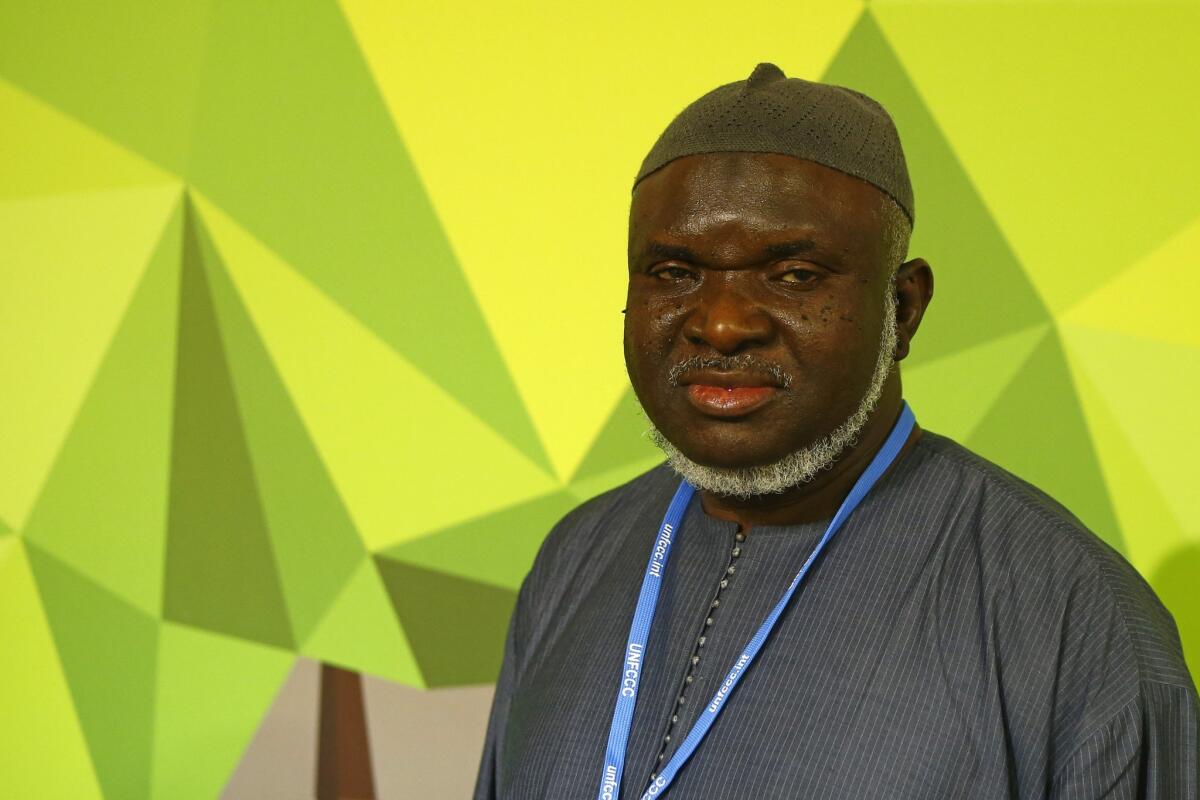
Imam Ibrahim Saidy of Norway at the United Nations Climate Change Conference outside Paris on Tuesday.
Imam Ibrahim Saidy brought his symposiums and his monthly fasting to the Paris climate talks, hoping to call attention to the problems and injustice of global warming.
He calls it "green jihad."
The Muslim cleric from Norway came up with the idea of an environmental holy movement a year ago. He uses the word "jihad" in its meaning of a struggle to do good, as opposed to extremists' use of it to signify a holy war.
"The green jihad is to protect and save lives," Saidy said Tuesday. "To make people aware of the dangers of climate change and fight for climate justice."
Saidy is part of a growing interfaith religious movement seeking action by governments to fight global warming. For the last two years, about 10,000 religious activists have been fasting on the first day of the month to call attention to global warming, according to Caroline Bader of the Lutheran World Federation.
Op-ed: Without Congress' support, Obama's dealmaking powers in Paris are limited
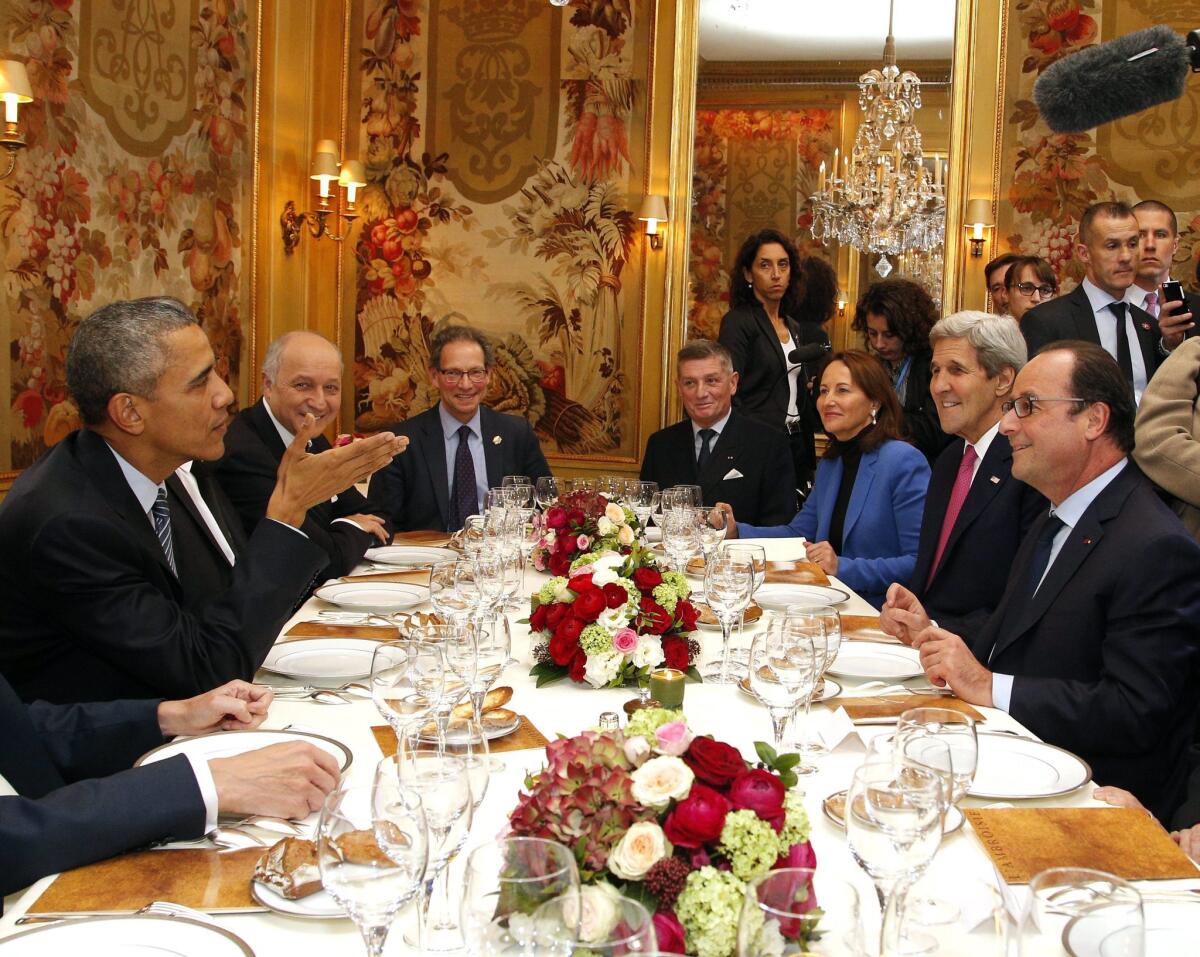
President Obama sits with French President Francois Hollande (right), Secretary of State John Kerry, and other officials as they have dinner at the Ambroisie restaurant in Paris on Nov. 30.
John Bolton, the former U.S. ambassador to the United Nations, and John Yoo, a professor of law at UC Berkeley, penned an op-ed in The Times today questioning President Obama's ability to get legally binding carbon reductions approved by the U.S. Senate.
"Obama may rely on his unilateral authority to join a world climate pact, but without Congress his most important promises will be empty ones whose fate will be left to his successor," they wrote.
Bolton and Yoo are affiliated with the American Enterprise Institute, and each served in the George W. Bush administration.
House votes to block new climate rules as Obama returns from Paris
Californiaâs delegation voted along party lines Tuesday when the House passed two resolutions aimed at blocking President Obamaâs carbon dioxide limits for power plants .
One resolution would stop the limits for existing power plants, known as the Clean Power Plan, which mandates a 32% cut in the power sectorâs carbon emissions by 2030. The resolution passed 242-180.
The other would block the carbon limits for new power plants. It passed 235-188. Both resolutions began in the Senate, but needed House approval.
âToday, the House rejected the presidentâs false premise that a cleaner environment can only be achieved by arbitrary bureaucratic rules. As it always has, our success depends on freeing our economy, not tying it down with burdensome regulations,â Majority Leader Kevin McCarthy (R-Bakersfield) said in a statement.
The restrictions were a big part of the pledge Obama made going into the Paris climate talks. When the Senate passed the resolutions in mid-November, the White House said Obama would veto them. The House vote came as Obama returned from Paris today.
Rep. Scott Peters (D-San Diego) said House Republicans didnât offer an alternative to the presidentâs Clean Power Plan.
âAt a time when world leaders are coming together in Paris to reach a historic accord to slow climate change, Congress should be leading the way to support them, not undermining them,â he said in a statement.
Brown to arrive early in Paris
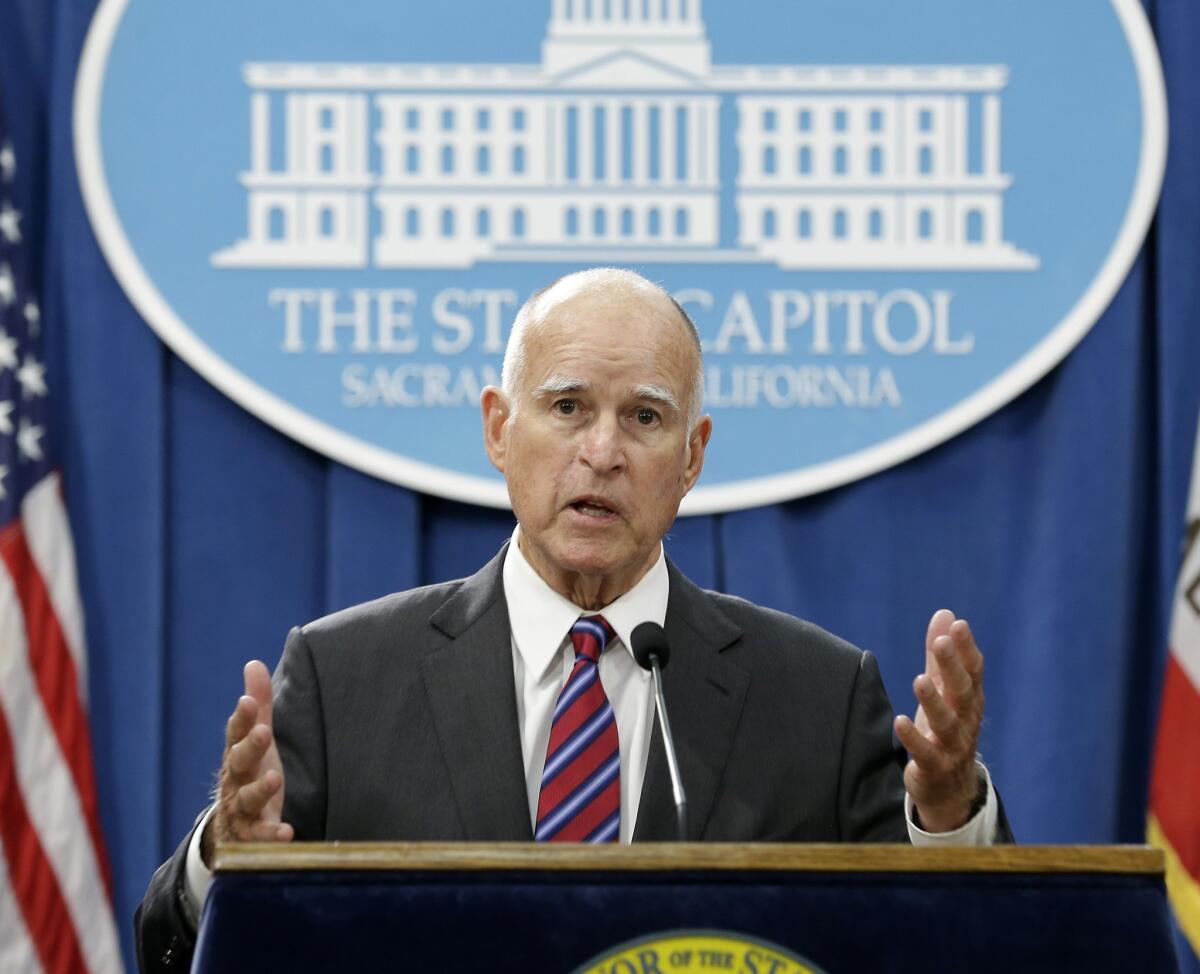
California Gov. Jerry Brown recently signed a bill requiring licensed family planning or pregnancy-related facilities to notify customers that the state offers free or low-cost access to a variety of family planning services, including abortion.
Gov. Jerry Brown is due in Paris on Friday morning, a day earlier than initially planned, to deliver remarks at an event featuring U.N. Secretary-General Ban Ki-moon.
Brown's schedule is packed with speeches, panel discussions and news conferences, with 21 appearances in seven days.
The events include a discussion about California's renewable-energy efforts, a keynote speech at a session with climate scientists about research and policy, and a talk on how China and California are cooperating to curb air pollution and promote clean technology.
Though California is not party to the ongoing climate negotiations among world leaders, Brown and other state officials are expected to tout its position as a leader in the battle against climate change.
See Brown's full itinerary here.
Donald Trump on climate talks: 'What a ridiculous situation'
Donald Trump posted his thoughts on Obama's visit to the Paris climate talks Tuesday.
"While the world is in turmoil and falling apart in so many different ways, especially with ISIS, our president is worried about global warming," said Trump, shown sitting at a desk in a leather chair.
"What is Obama thinking?" read the caption that accompanied the clip.
Trump said this week that Obama's statements about the threat of climate change are among the "dumbest statements" in politics.
Trump is not the only presidential hopeful taking shots at the president's attendance in Paris.
New Jersey Gov. Chris Christie, Sen. Marco Rubio and former Florida Gov. Jeb Bush have said Obama is placing too much emphasis on the climate.
Meanwhile, back in Iowa...
Jeb Bush was peppered with questions about climate change and the Paris talks Tuesday as he swung through campaign stops in Iowa.
Bush also criticized Obama's speeches from Paris and said he wasn't sure he would have attended if he were president.
McCarthy: Obama has 'distorted view' of link between climate change and terror
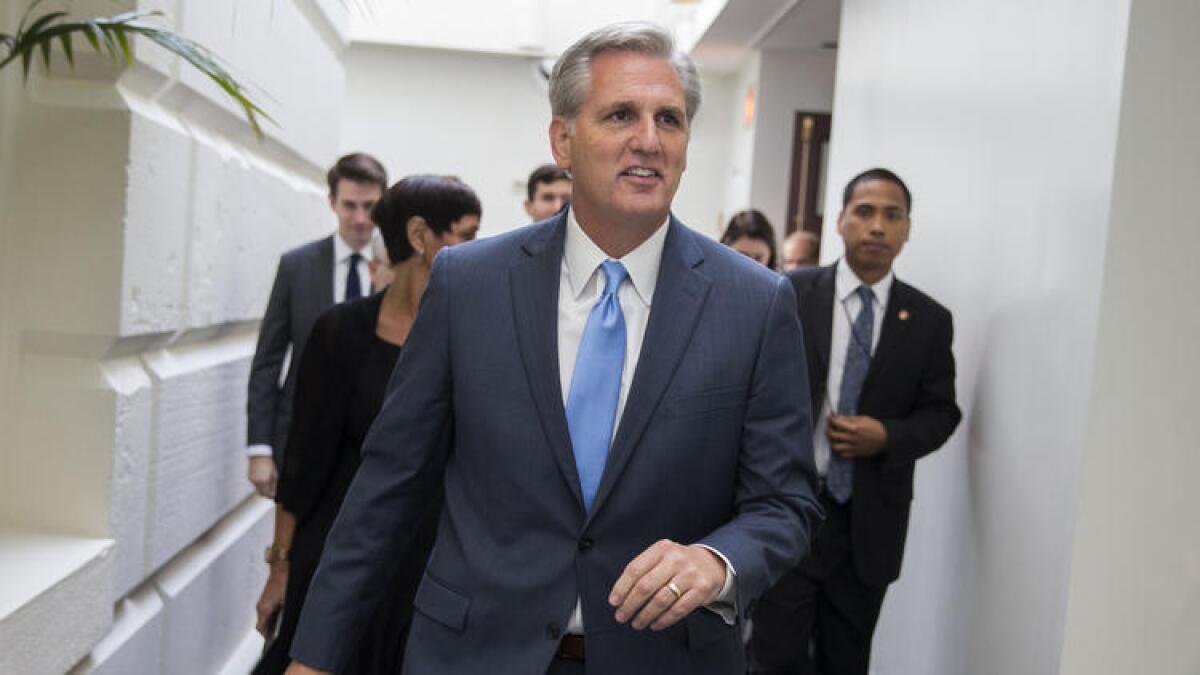
House Majority Leader Kevin McCarthy of California leaves a meeting on Capitol Hill.
California's top Republican, House Majority Leader Kevin McCarthy (R-Bakersfield), is taking aim at a key argument of President Obama -- namely, that there's a link between climate change threats and international security and terrorism.
As the second day of the Paris summit comes to a close, McCarthy is taking aim at Obama's Monday comments in the French capital.
McCarthy says it's a "distorted view of the threats facing our nation" in a statement released Tuesday afternoon in Washington, D.C.
"The White House hopes to negotiate a climate change deal is supported by nothing more than a massive slate of regulations that will reduce the reliability and affordability of the energy that powers our lives," said McCarthy.
Getting 'big things done here'
Before leaving Paris, President Obama said he is confident a deal will be reached as global climate talks continue over the next two weeks.
Carbon dioxide limits
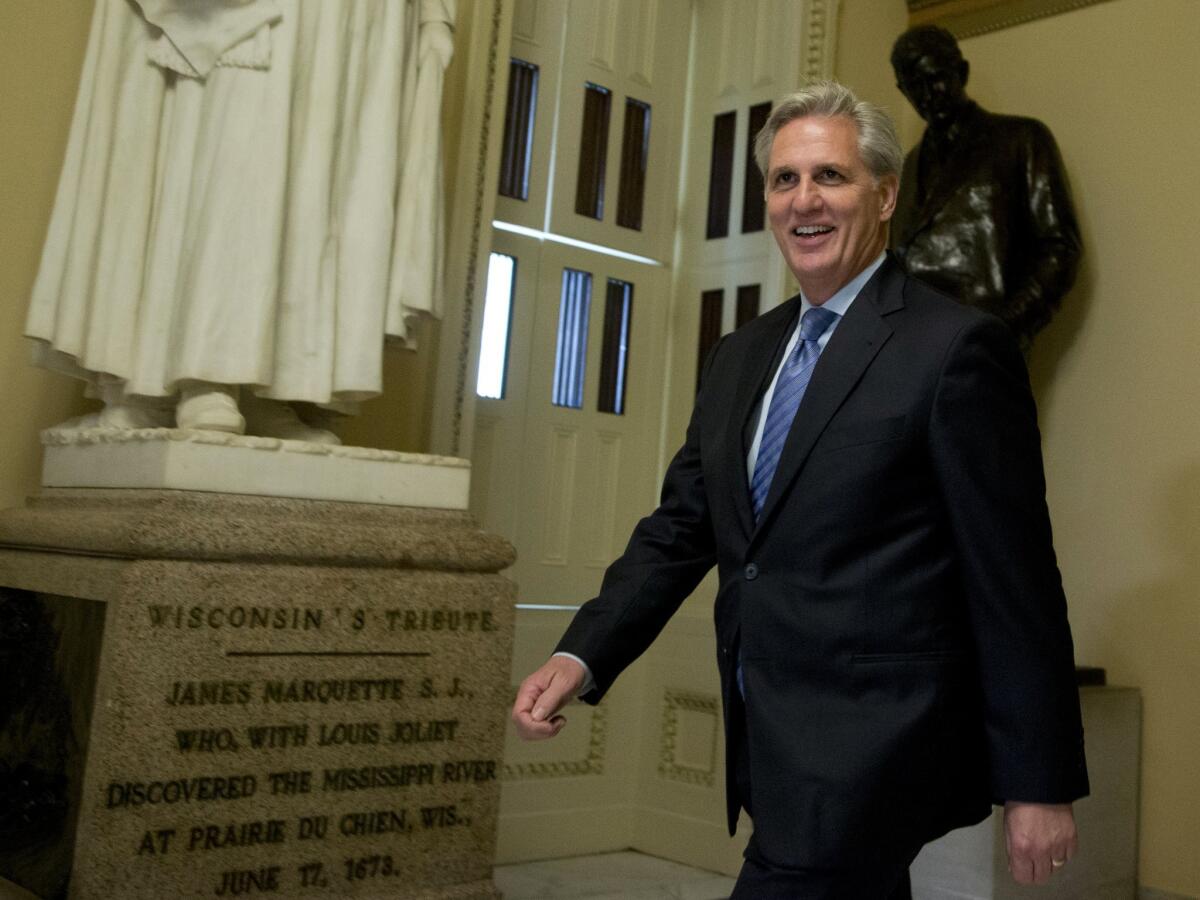
House Majority Leader Kevin McCarthy of California walks toward the House Chamber on Capitol Hill.
As President Obama makes his way home today from the Paris climate talks, the House is scheduled to vote on two Senate resolutions aimed at blocking his carbon dioxide limits for power plants.
One resolution would stop the limits for existing power plants, which mandate a 32% cut in the power sectorâs carbon emissions by 2030. The other would block the carbon rule for newly built power plants.
The restrictions were a big part of the pledge Obama made going into the Paris talks. When the Senate passed the resolutions in mid-November, the White House said Obama would veto them.
California business leaders rally for climate action
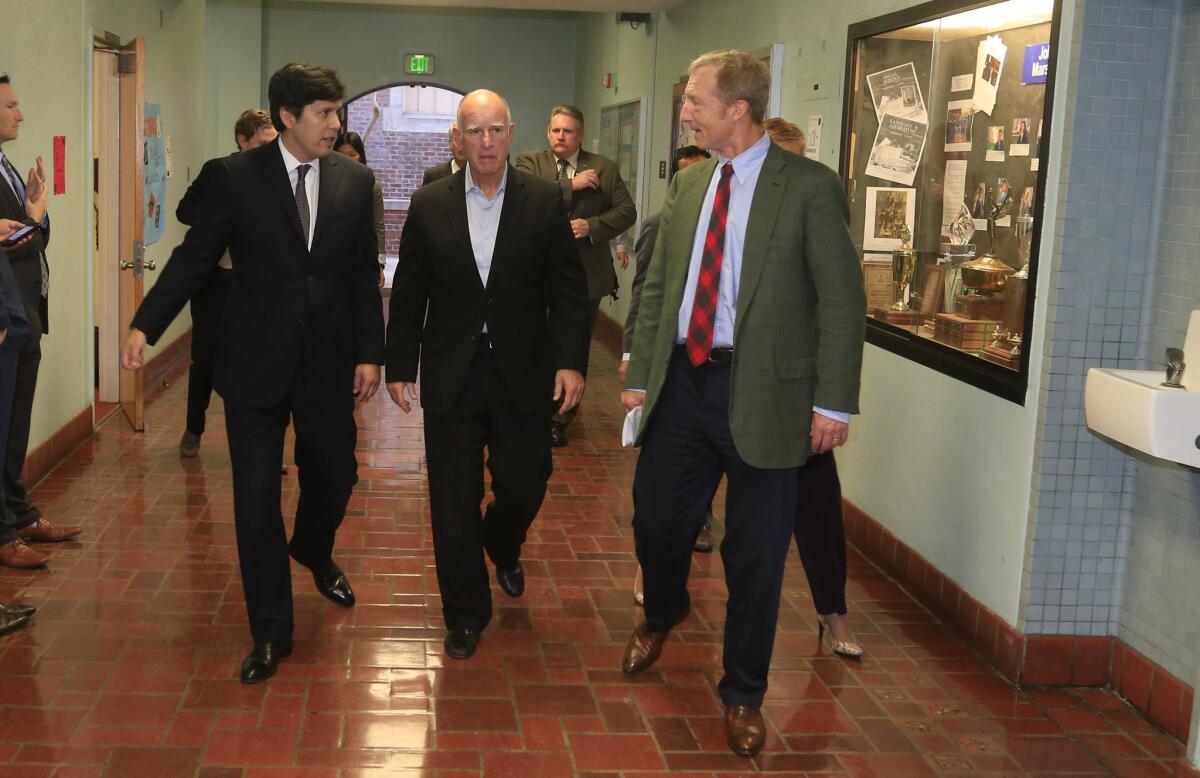
More than a dozen California business leaders will be joining Gov. Jerry Brown and Tom Steyer, an environmental activist and Democratic donor, at the United Nations summit in Paris.
The executives represent energy companies, electric utilities, healthcare firms and the banking industry, and Steyer hopes their presence delivers the message that fighting climate change doesnât harm the economy.
âActually doing the right thing in terms of progressive energy policies leads to a more prosperous, better employed society,â Steyer said in a recent interview.
Arguments to the contrary, he said, are âbaloney.â
Brown and Steyer had invited the executives to Paris with a letter on the governorâs stationery, asking them to help âshare Californiaâs success stories with world leaders and to urge other business leaders to support similar efforts.â
â Chris Megerian
Cost vs. benefit
House Speaker Paul Ryan was asked at a news conference Tuesday morning if House Republicans are out of step in light of a new New York Times poll showing most Americans want the United States to join some kind of binding international climate agreement. His answer:
View the poll here .
Organizing the world
President Obama left Paris on Tuesday expressing confidence that international negotiators will be able to reach a strong climate pact, acknowledging the difficulty of the task ahead over the next two weeks but telling reporters: âI am convinced that we are going to get big things done here.â
At a news conference closing his brief visit to the French capital, the president also defended his focus on addressing the threat of climate change amid a host of other challenges, including Islamic State.
âThis one trend, climate change, affects all trends,â he said, arguing that changing weather patterns could put greater strains on Americaâs economic and military resources. âThis is an economic and security imperative that we have to tackle now. And great nations can handle a lot at once.â
Some in Washington see American leadership as simply âwhether or not we're sending troops somewhere,â the president said, but emphasized his administrationâs work to build an international framework that could lead to a major agreement was consistent with his view that America can do more.
âPart of what I've been trying to describe during the course of my presidency is that where we make the most impact ⌠when we are helping to organize the world around a particular problem,â he said.
The hard work starts today
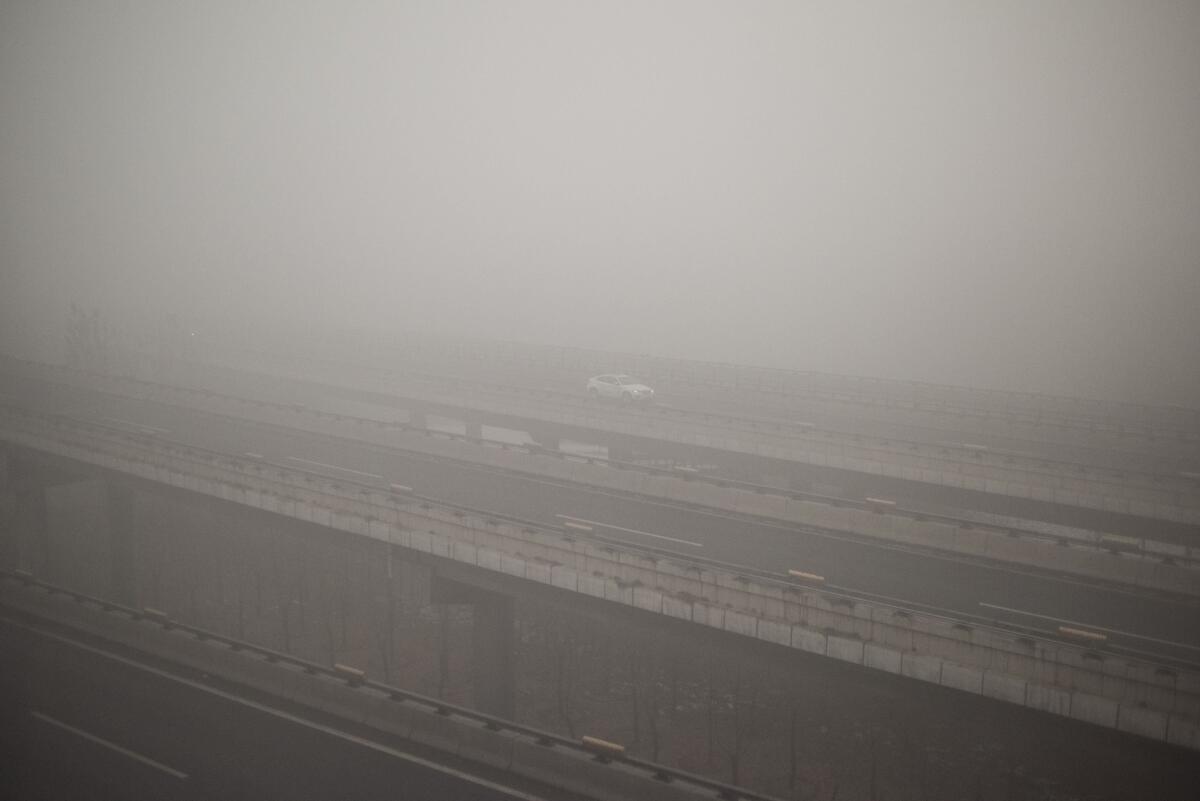
A car drives along a highway on a polluted day in Beijing on December 1, 2015. China has ordered thousands of factories to shut as it grapples with swathes of choking smog that were nearly 24 times safe levels on December 1, casting a shadow over the countryâs participation in Paris climate talks. A thick grey haze shrouded Beijing, with the concentration of PM 2.5, harmful microscopic particles that penetrate deep into the lungs, climbing as high as 598 micrograms per cubic metre AFP PHOTO / FRED DUFOURFRED DUFOUR/AFP/Getty Images ** OUTS - ELSENT, FPG, CM - OUTS * NM, PH, VA if sourced by CT, LA or MoD **
President Obama is now on his way out of Paris, and most of the other heads of state have also left the French capital after delivering hard-hitting speeches Monday, declaring the future of the planet is at stake.
Now the hard work really begins.
Negotiators are sitting down together to hash out a deal that's acceptable, and achievable, for everyone. Months of hard work have led up to this moment, and the teams are working off a document that is more than 50 pages long. They will attempt to whittle the text down to half that length by Saturday, a deadline set by French Foreign Minister Laurent Fabius.
Next week, countries will send higher-level negotiators to the meetings in Paris, where they will hone in on the core issues and attempt to come up with a lasting political agreement.
Some of the major sticking points will include:
-- who should cover the cost of shifting the world's economies to solar, wind and other renewable energy sources.
-- a debate over carbon pricing and decisions about who should pay to help the world's poorer countries that are suffering the worst effects of climate change, such as rising sea levels and intense droughts.
How much CO2 will the talks create?
Wired has done the math, but warns readers to "keep in mind, this is all back of the napkin stuff. (If you want something more accurate, the UNFCCC plans to release its own calculations soon.) Not perfect, but a serviceable reminder that these talks are not free in terms of raw emissions."
Watch live: Obama speaks from Paris
Obama: Agreement should have legally binding provisions
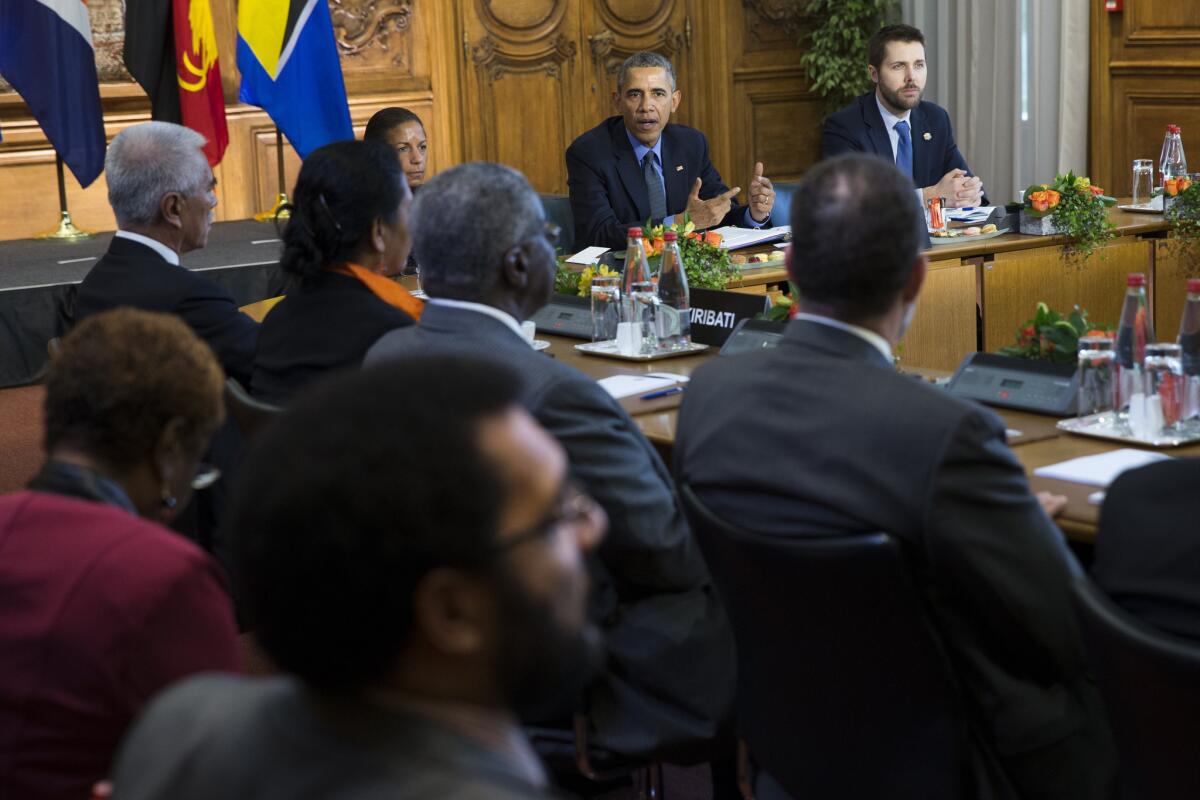
U.S. President Barack Obama speaks during a meeting with heads of state from small island nations most at risk from the harmful effects of climate change, in Paris, on Tuesday, Dec. 1, 2015. (AP Photo/Evan Vucci)
Any final climate agreement in Paris should include legally binding provisions to ensure nations follow through on ambitious targets, President Obama said Tuesday as he pointed to the plight of island nations whose very existence was at stake to argue for an accord that served "the most vulnerable."
On his second day in the French capital, Obama convened a meeting of leaders of Kiribati, the Marshall Islands, Papua New Guinea, St. Lucia and Barbados -- nations he said "could disappear entirely" and prompt a new refugee wave without strong joint action on climate change.
As an "island boy" himself, noting his roots in Hawaii and time growing up in Indonesia, the president said he understands "both the beauty but also the fragility" of those nations.
"Their voice in these negotiations will be absolutely vital," Obama said.
"We have to have an ambitious agreement. Although the targets themselves may not have the force of a treaty, the process, the procedures that ensure transparency and periodic reviews, that needs to be legally binding."
The White House has been careful to say that any agreement the United States might sign on to would not have the force of a treaty as did the 1997 Kyoto protocol, which was never ratified by the U.S. Senate.
Deputy national security advisor Ben Rhodes said Monday that by seeking a binding treaty "we would have lost the capacity to have that truly global effort" as countries would be deterred from setting ambitious emissions reductions targets.
"At the same time, we want to make sure that there is transparency so that we know that countries are standing behind their commitments," he said. "There are reporting requirements so that there's an ability to evaluate whether countries are following through. ... Some of those, I think, will have requirements attached to them."
Protesters urge rich nations to âdo your shareâ
Chanting âKeep this fair, do your share,â protesters at the Paris climate conference are warning that developing countries risk losing out on a global accord under negotiation to fight global warming.
A dozen activists unfurled banners and performed a skit Tuesday outside the exhibition halls hosting high-stakes climate talks through Dec. 11.
âCOP is rigged for rich countries,â read one banner, referring to the conference's formal name, COP21.
A key sticking point in the talks is who should shoulder more economic responsibility for reducing emissions and helping countries cope with effects of global warming already under way.
Peruvian activist Maria Alejandra Rodriguez Acha said her country is facing climate threats on many fronts â from coastal erosion by the Pacific Ocean to shrinking forests in the Amazon.
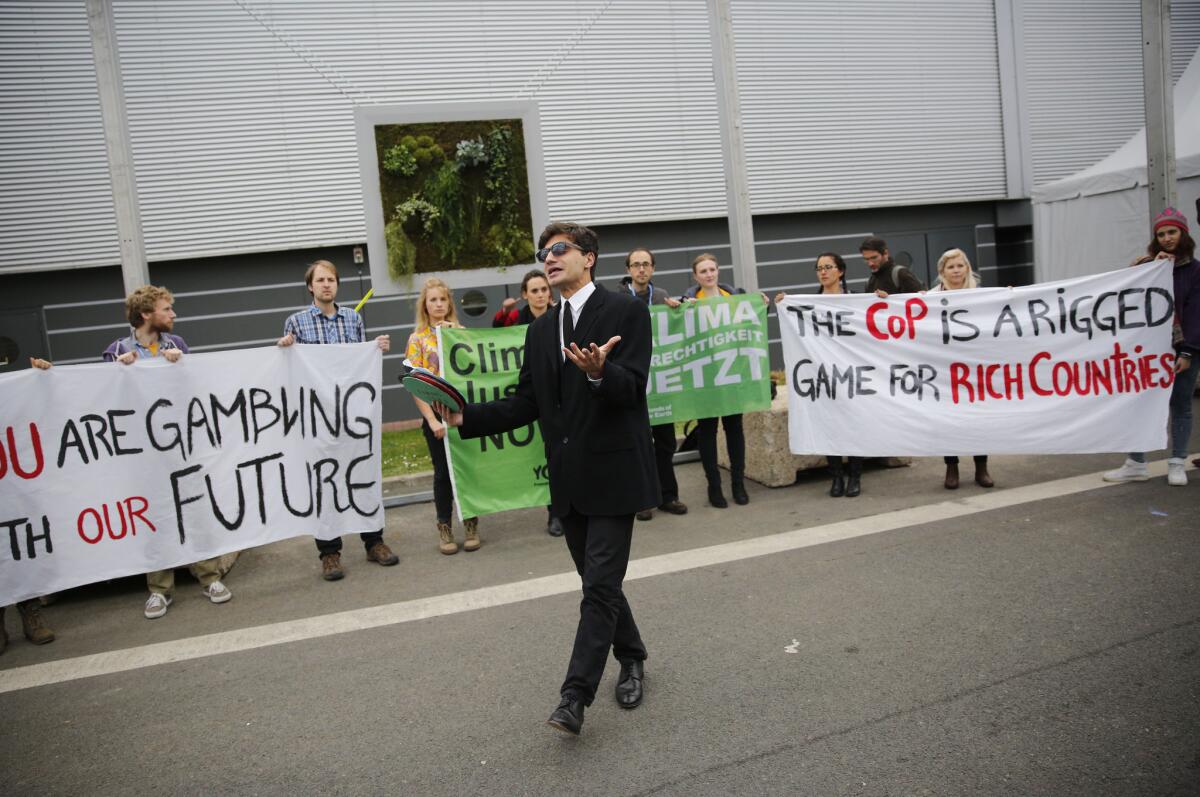
Activists hold banners at the the United Nations Climate Change Conference Tuesday, Dec. 1, 2015, in Le Bourget, north of Paris.
Day two: French and African leaders discuss global warming
French President Francois Hollande is holding talks with African leaders about what their countries need to cope with to reduce global warming.
The meeting Tuesday is part of broader international diplomatic efforts toward a possible long-term accord for all countries to cut man-made carbon emissions. Those emissions produce heat-trapping gases, scientists say, causing glaciers to melt and sea levels to rise and leading to more and more droughts and other extreme weather.
-- Associated Press
Some perspective from above
Astronaut Scott Kelly tweeted from the International Space Station today as the conference got underway.
How a 'mess' in Copenhagen could lead to an agreement in Paris
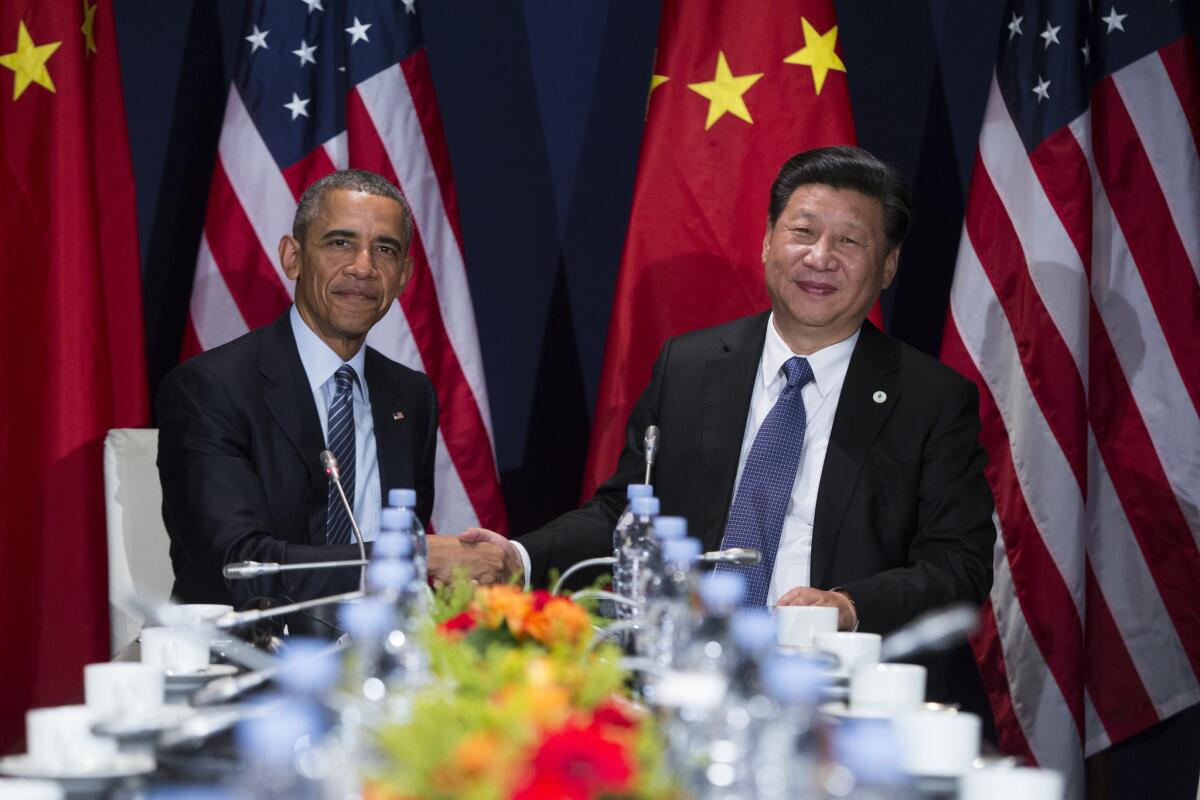
President Obama meets with Chinese President Xi Jinping during the United Nations climate change summit on Nov. 30.
What has President Obama learned since the Copenhagen climate talks fell apart in 2009?
Times reporter Michael A. Memoli takes a look at the moves Obama has made since then to ensure success at the Paris gathering. After the earlier talks fell apart, Obama traveled the globe prodding developing nations to set ambitious goals to increase renewable energy production.
Especially significant was a commitment made by Obama and Chinese President Xi Jinping last year to reduce emissions: The U.S. agreed to cut net greenhouse gas emissions at least 26% by 2025, and China said it would accelerate its carbon reduction while increasing its use of nuclear, wind and solar energy.
Today, Obama credited those pledges with helping to spur significant promises from more than 180 other countries to fight global warming â including developing nations that had been absent from previous accords, such as the one adopted in Kyoto, Japan, nearly two decades ago.
âOur leadership on this issue has been absolutely vital,â Obama said.
House doesn't have to fund climate deal, majority leader says
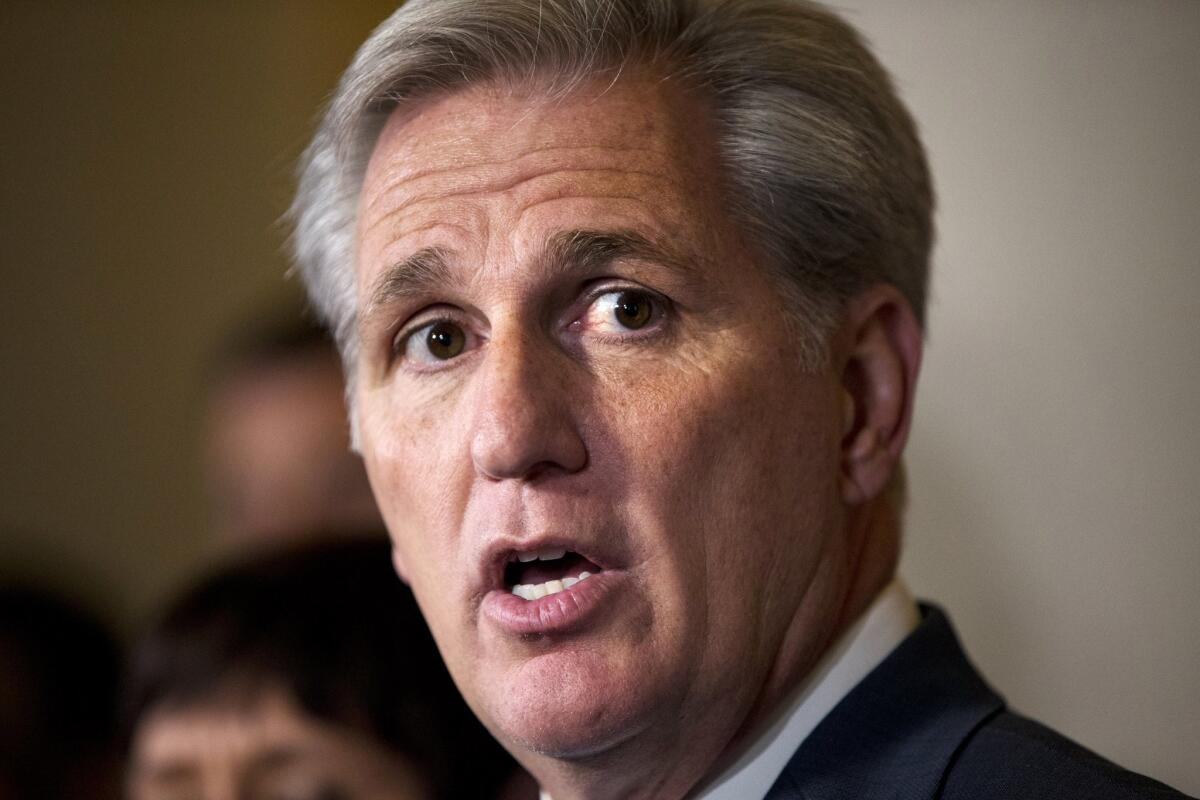
FILE - In this Oct. 8, 2015 file photo, House Majority Leader Kevin McCarthy of Calif. speaks during news conference on Capitol Hill in Washington. Rebellious conservatives around the country say they sense a political environment that will help them oust House Republican lawmakers next year who are too timid when it comes to confronting President Barack Obama. (AP Photo/Jacquelyn Martin, File)
The House doesnât have to provide funding for any climate change agreements President Obama agrees to while in Paris, House Majority Leader Kevin McCarthy (R-Bakersfield) told reporters Monday.
âWe have the authority to debate and decide where we spend our money, and I donât think thatâs the best use of our money,â he said.
In an editorial in Reuters on Sunday, McCarthy argued that the United States has done a lot to reduce carbon emissions already. He said Obama should advocate for the expansion of natural gas development around the globe.
McCarthy said he still wants to hear what the president has to say.
âLetâs see what pledges heâs made, because everything Iâm reading, heâs downplaying whatâs going forward,â McCarthy said. âI hope he makes the pledges that America becomes energy-independent and continues the process of where weâre going from the aspect of lowering CO2 emissions from exploring and being able to have more natural gas.â
University of California to play big role in Bill Gates climate fund
The UC system has pledged $1 billion to a new private fund that will invest in the development of large-scale carbon-free energy solutions.
The fund, announced Monday by billionaire philanthropist and Microsoft co-founder Bill Gates, has received about $7 billion in pledges for clean energy research, according to Monday's announcement.
âThe University of California, with its 10 campuses and three national energy labs, is home to some of the best climate scientists in the world and as a public research institution we take the imperative to solve global climate change very seriously,â UC President Janet Napolitano said in a statement .
The University of California is the "sole institutional investor" in the fund, the statement said.
Dinner with Obama: At the table and on the menu
President Obama and French President Francois Hollande were seated along with other U.S. and French officials shortly after 8 p.m. Monday at L'Ambroisie, a famed restaurant with three Michelin stars on Paris' Place des Vosges.
The guest list included Secretary of State John F. Kerry, national security advisor Susan Rice and Jane Hartley, U.S. ambassador to France. In the French delegation were Prime Minister Manuel Valls; Laurent Fabius, minister of foreign affairs; and Segolene Royal, Hollande's former wife and the current minister of ecology, according to pool reports.
On the menu were scallops from Brittany with truffles; sea bass with artichoke, dill and beurre blanc; and Iranian Oscietra Gold caviar.
India's Modi: Developing countries need 'room to grow'
Indian Prime Minister Narendra Modi focused on the role of developed countries like the United States in stemming climate change, adding that poorer countries need "room to grow" as they struggle with economic development.
"The prosperous still have a strong carbon footprint and the world's billions at the bottom of the development ladder are seeking space to grow," Modi said. "The choices are not easy. But we have awareness and technology."
More than 300 million Indians have no access to power , and hundreds of millions more have only spotty access.
Also on Monday, India and France announced the launch of a global alliance to promote solar energy. 120 countries have signed on to the alliance, aimed at getting rich and poor countries to cooperate to develop and expand solar power technology.
Say fromage!
Britain's David Cameron also points to future generations
Gov. Jerry Brown's mood ahead of his arrival
Sacramento bureau chief John Myers writes that California Gov. Jerry Brown sent a letter ahead of the summit to the attorneys general of Texas and West Virginia, accusing them of "crass obstructionism" in their effort to raise doubts about one of President Obama's key climate change initiatives. He said they were seeking to score political points in their recent attempt to cast doubt on the legality of U.S. efforts.
Bill Gates announces pledges of $7 billion for research and development of clean energy
On the first day of the global climate conference in Paris, Bill Gates announced that he and other investors are pledging $7 billion for research and development of clean energy, and that they're hoping to get others to pitch in more in the coming days.
The Microsoft co-founder announced the investment as part of a larger initiative with world governments that are promising to double spending on renewable-energy research.
Gates told reporters that he is hoping to see more investors sign on "possibly this week." The money is being raised by individual wealthy investors and the University of California.
Gates said he has warned potential investors that new energy technologies take longer than IT or biotech to launch.
The fund will support a wide range of technologies, Gates said, including "biofuels, carbon capture, high wind, fission, fusion -- we're unbiased but it has to be clean and possible to scale up cheaply."
More speeches from the first day
Chinese President Xi Jinping says an eventual global climate deal must include aid for poor countries and acknowledge differences between developing and established economies.
Xi said an agreement should also include transfer of climate technology to developing countries.
The above video features French Foreign Minister Laurent Fabius and Prince Charles of Wales. Fabius spoke in French. Prince Charles' speech begins at 1:12.
Delivering the keynote to the United Nations climate conference, Charles urged world leaders Monday to think of their grandchildren in seeking a deal.
Echoing the sentiment offered by Winston Churchill to Battle of Britain pilots during World War II, he argued that "rarely in human history have so many people around the world placed their trust in so few."
The heir to Britain's throne and champion of green causes told delegates: "I urge you to consider the needs of the youngest generation, because none of us has the right to assume that for our today they should give up their tomorrow."
Bill McKibben on what the climate change conference can accomplish
Bill McKibben, the founder of the global climate campaign 350.org and a professor of environmental studies at Middlebury College in Vermont, writes in The Times:
"If the coal, gas and oil industries no longer enjoy a chokehold on the outcome of climate talks, their power hasn't disappeared. There will be no formal treaty in Paris; everyone knows there aren't enough votes in the Senate to ratify an international treaty based on a rational climate policy. But neither will Paris be a failure: The pledges that governments plan to finalize there should suffice to hold warming to 3 or 3.5 degrees Celsius over the course of the century. Right now, the planet is heading for a 5-degree increase, so that's an improvement.
Still, even 3 degrees means Earth is on a path to destruction. There is wide agreement that any temperature increase greater than 2 degrees Celsius threatens civilization; we passed the 1-degree mark this fall and already the Arctic is melting, the West is confronting epic drought and the ocean is 30% more acidic.
All of this means that Paris should be both a scoreboard and a springboard. It will show how far we've come, and it could launch more progress."
How to fit 150 leaders in one photo
Watch Obama speak, warn against cynicism on climate change solutions
In his address to the conference today, President Obama acknowledged that taking strong action on the environment has not always been a political winner. But he noted that the U.S. and other global economies have grown even as fossil fuel emissions have leveled off.
âWe have proved that strong economic growth and a safer environment no longer have to conflict with one another,â he said. âAnd that should give us hope.â
Saying the science of global warming was undeniable, the president highlighted steps that his administration has taken to curb emissions and praised the many other nations that have committed to do the same in the lead-up to the summit, known as COP 21. But he pressed leaders to do more, warning against âcynicism -- the notion that we canât do anything about climate change.â
How might this all turn out?
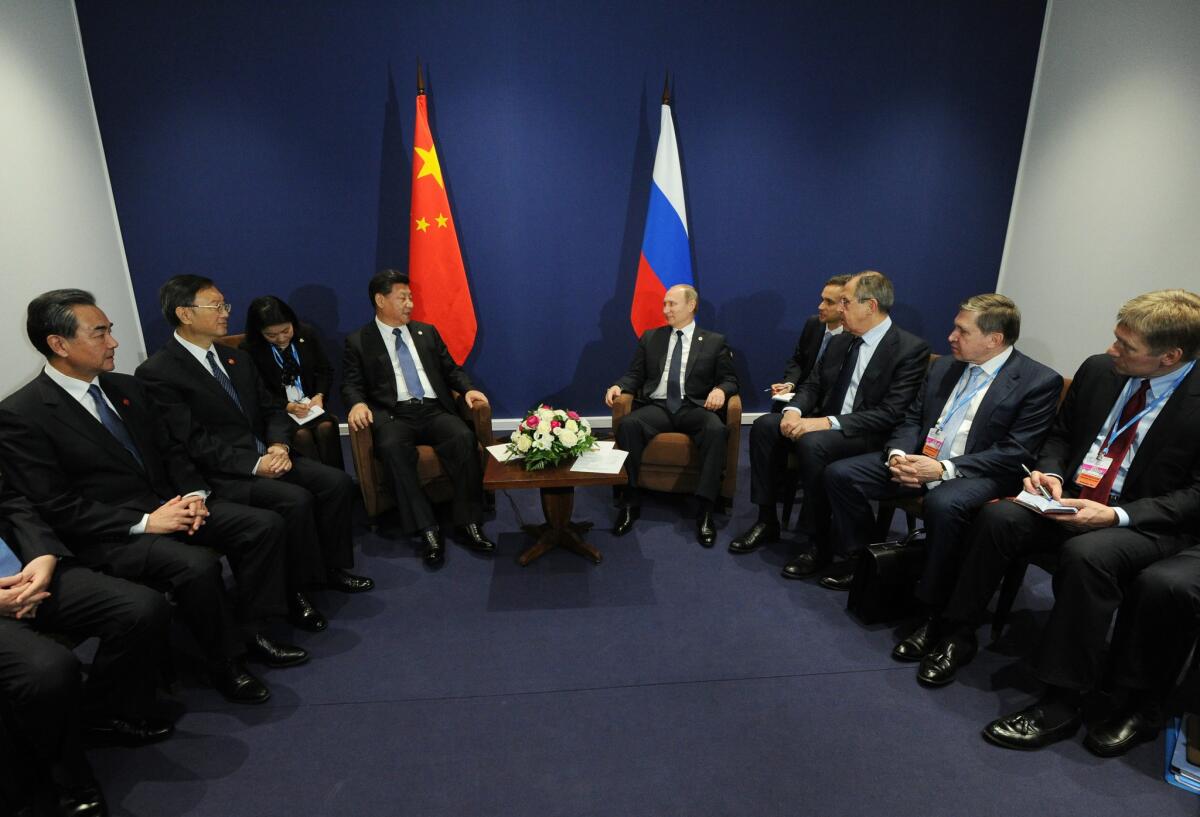
epa05049436 Russian President Vladimir Putin (C-R) meets with Chinese President Xi Jinping (C-L) on the sidelines of the COP21 United Nations Climate Change Conference in Le Bourget, outside Paris, France, 30 November 2015. The 21st Conference of the Parties (COP21) held in Paris from 30 November to 11 December is aimed at reaching an international agreement to limit greenhouse gas emissions and curtail climate change. EPA/MIKHAIL KLIMENTYEV / SPUTNIK / K MANDATORY CREDIT ** Usable by LA, CT and MoD ONLY **
William Yardley and Alexandra Zavis took a look at possible outcomes at the conference â widely expected to produce a historic agreement among nations to reduce greenhouse gas emissions that scientists say cause global warming. Yet for all the potential for Paris to deliver a transformative and unifying moment, they write, experts say that on a practical level, it might prove just another steppingstone in the long stop-start international effort to address climate change.
Sign up for Essential California
The most important California stories and recommendations in your inbox every morning.
You may occasionally receive promotional content from the Los Angeles Times.







